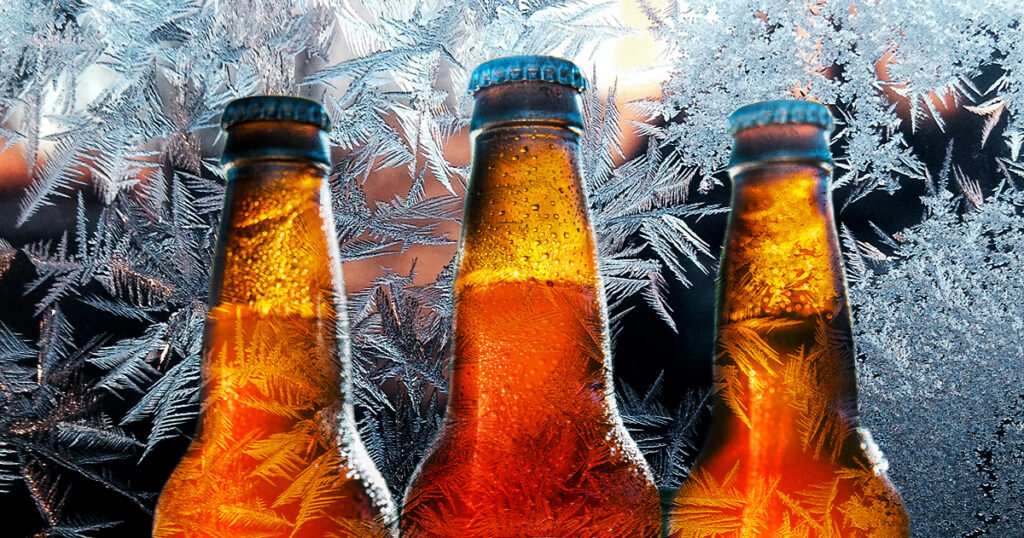The question of what temperature beer freezes at is more than a matter of mere curiosity; it’s a fascinating intersection of chemistry, physics, and the art of brewing itself. “What Temperature Does Beer Freeze At?” delves into this intriguing subject, offering readers a blend of scientific analysis and practical knowledge, all penned by experts with a deep understanding of the brewing process and the physical properties of beer. This article not only aims to answer the titular question but also to explore the variables that influence the freezing point of this beloved beverage, including alcohol content, beer style, and the presence of additives.
Beer, with its rich history and cultural significance, is more than just a drink; it’s a complex liquid with properties that vary significantly from one brew to the next. Understanding its freezing point is crucial for brewers who strive to maintain the quality and consistency of their products, as well as for consumers looking to store their beer without compromising its taste or texture. This exploration into the freezing temperature of beer is not just a journey through the cold; it’s an enlightening voyage into the heart of what makes beer so uniquely susceptible to temperature changes.
Crafted with the intent to educate, fascinate, and engage, “What Temperature Does Beer Freeze At?” promises to be an essential read for anyone involved in the brewing industry, as well as beer enthusiasts keen on expanding their knowledge. The article is meticulously structured to provide a comprehensive understanding of the science behind beer’s freezing point, while also touching on practical tips for avoiding the dreaded frozen beer mishap. So, whether you’re a professional brewer, a homebrew aficionado, or simply a beer lover looking to learn more about the drink you cherish, this piece is set to deepen your appreciation and insight into the liquid gold we call beer.
The Freezing Point of Beer
Beer freezes at around -2°C to -3°C (28°F to 26°F) depending on its alcohol content, sugar content, and carbonation level. The freezing point of beer can vary, with light beers freezing at around 0°C (32°F) and stronger beers freezing closer to -4°C (24°F). The higher the alcohol content in beer, the lower its freezing point, meaning beers with higher ABV take longer to freeze. To prevent beer from freezing, it should be stored in a cool, dark place away from extreme temperature fluctuations, ideally between 50-55°F (10-13°C) for long-term storage. If beer does freeze, it can alter its taste, texture, and carbonation, but it can still be used for purposes like making beer margaritas or beer popsicles.
Scientific Explanation of the Freezing Process
To understand how alcohol impacts freezing, let’s review some science basics. Freezing occurs when a liquid’s molecules slow down enough to form solid crystals. Alcohol molecules interfere with water molecule interactions, lowering the temperature needed for crystals to form.
The more alcohol present, the greater this freezing point depression effect. Other dissolved compounds can also influence freezing points through the same mechanism.
Impact of Beer Style on Freezing Point
Given alcohol’s key role, freezing points differ across beer styles. Stronger beers freeze at lower temperatures.
For example:
- Light lagers (around 4-5% ABV): 25°-30°F
- India Pale Ales (6-7% ABV): 20°-25°F
- Barleywines (8-12% ABV): 15°-20°F
Ingredients also matter. Wheat beers often freeze at slightly higher temperatures than barley-based beers, as wheat proteins can interfere with crystal formation.
Overall though, alcohol content has the largest effect.
The Role of Alcohol Content
Alcohol’s freezing point depression power is clear when examining how ABV correlates with freezing points:
| ABV | Freezing Point |
| 2.5% | 30°F |
| 5% | 27°F |
| 7.5% | 22°F |
| 10% | 19°F |
| 15% | 16°F |
This demonstrates the linear relationship between increasing alcohol and lowering freezing temperature.
Factors Influencing Beer Freezing Time

Once temperature drops low enough, multiple factors influence how quickly beer freezes solid:
- Insulation – A well-insulated freezer means faster freezing. No insulation slows it down.
- Volume – Smaller volumes freeze faster than large batches.
- Sugar content – More sugar equals slower freezing. Belgian beers high in residual sugars require colder temperatures.
- Adjuncts – Ingredients like oats or wheat slow freezing.
So while alcohol content controls the freezing point, other aspects impact freezing time. Monitor freezers accordingly.
Guidelines for Freezing and Thawing Beer
Freezing beer intentionally requires forethought. Here are some best practices:
- Adjust freezer temperature – Set the freezer between beer’s freezing point and 28°F.
- Freeze small volumes – Limit to a six pack or bottles, not corny kegs.
- Insulate properly – Wrapping bottles in insulation like bubble wrap speeds up freezing.
- Freeze for brief periods – Remove after 1-2 hours to avoid damage.
Thawing is equally important:
- Refrigerate to thaw – Leave frozen beer sealed at 40°F to thaw over 12-24 hrs.
- Don’t microwave bottles – This can cause explosions or alter flavors.
- Open slowly – Point away from yourself when opening as contents may gush out.
The Dangers of Frozen Beer
Freezing causes beer bottles to explode for two reasons:
- Volume expansion – Water expands in volume by 9% when freezing.
- CO2 solubility – When freezing, CO2 bubbles can’t remain dissolved, building pressure.
Combined, this creates a dangerous pressure bomb. Never leave beer bottles in the freezer unattended.
Even if frozen slowly, always handle icy bottles with great care. Thaw and open over sinks to prevent messy explosions.
Storage Recommendations for Different Beer Types
Proper storage preserves beer’s taste and quality. Recommended temperature ranges:
- Ales: 50–60°F (cellar temperature)
- Lagers: 45–55°F (refrigerator temperature)
- Belgian styles: 45–55°F. Higher for lambics at 50–65°F
Avoid freezing temperatures in home refrigerators, especially for bottle conditioned beers where yeast is present. Freezing will shock yeast and create off-flavors.
Creative Uses for Frozen Beer

While exploding bottles are dangerous, frozen beer has fun applications:
- Beer slushies – Blend partially frozen brews into adult slushy drinks.
- Cooked dishes – Use frozen beer to replace water when cooking recipes like beer bread. Imparts flavor.
- Cold packs – Freeze beer in zip lock bags to create ice packs. Helps tenderize meat.
With some care, frozen beer can be an asset in the kitchen.
Expert Insights and FAQ
Brewing experts offer warnings about frozen beer:
“Freezing can irreparably damage taste and texture, especially for beers with live cultures still present.” – Gail Ann Williams, Beer Judge Certification Program
Frequently asked questions include:
- Can you freeze beer to concentrate alcohol? No, freezing merely separates water, not alcohol.
- Is frozen beer safe to drink after thawing? Generally yes if thawed slowly, but may suffer flavor defects.
- Why does tapping on a frozen beer bottle cause it to explode? The shock wave causes an already pressurized bottle to burst.
In general, most advise against intentionally freezing beer. Thaw frozen beer slowly and handle with care.
Comparative Analysis with Other Alcoholic Beverages
How does beer stacking up against other boozy beverages?
- Wine: Freezes around 27–35°F depending on alcohol level. Lower than average beer.
- Liquor: Ranges from -173°F for absinthe to 19°F for rum, correlating with ABV. Lower than most beers.
- Cider: Freezes around 28–30°F, fairly close to beer’s range.
So while beer doesn’t freeze at the extreme subzero temps of liquors like vodka or gin, it freezes at higher temperatures than wine or cider in most cases.
Conclusion
Understanding beer’s freezing points allows proper storage and preventing frozen explosions. While alcohol content primarily controls freezing, many other factors influence freezing time and impacts. With care, frozen beer can even be an asset in creative recipes. But regardless of application, respect the science and handle icy brews with caution.
More From Irish Setter Pub
- Jack Daniels Alcohol Percentage – How Strong Is Jack Daniels
- Does Non Alcoholic Beer Have Alcohol? Learn the Answer Now
- How Much Alcohol Is in Kombucha? Alcohol Content Of Kombucha
- Heineken Alcohol Content Profile| All Thing About This
- Does Ginger Beer Have Alcohol? And Why Say It’s Not An Alcoholic Drink?

